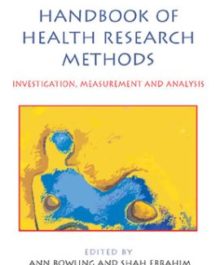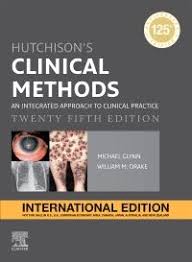Showing 73–84 of 172 results
Handbook of Health Research Methods: Investigation, Measurement and Analysis 1st Edition
KSh7,278.00Helps researchers to plan, carry out, and analyse health research, and evaluate the quality of research studies. This book is suitable for researchers and postgraduate students taking masters courses, or undertaking doctoral programmes, in health services evaluation, health sciences, health management, public health, nursing, and sociology.

Handbook of Laboratory Safety
KSh4,530.00Thoroughly revised, the CRC Handbook of Laboratory Safety, Fifth Edition includes new OSHA laboratory safety standards, the 1994 NRC radiation safety standards, guidelines for X-ray use in hospitals, enforcement of standards for dealing with blood-borne pathogens, OSHA actions covering hazardous waste operations and emergency response, and the latest CDC guidelines for research with microbial hazards. Every word on every page has been scrutinized, and literally hundreds of changes have been made to bring the material up to date.
See what’s new in the New Edition
- New figures and tables illustrating the new material
- Internet references in addition to journal articles
- Changes in the Clean Air Act regarding incineration of hospital, medical, and infectious waste
- Obsolete articles removed and replaced – over one hundred pages of new material
- New information on respiratory protection guidelines
Historical perspectives on organised crime and terrorism
KSh15,525.00This book explores historical accounts of organized crime and terrorism, drawing on research from around the world in such areas as the USA, UK, Ireland, France, Colombia, Somalia, Burma, Turkey and Trinidad and Tobago. Combining key case studies with fresh conceptualizations of organized crime and terrorism, this book reinvigorates scholarship by comparing and contrasting different historical accounts and considering their overlaps. Critical ‘lessons learned’ are drawn out from each chapter, providing valuable insights for current policy, practice and scholarship. This book is an indispensable guide for understanding the wider history of terrorism and organized crime. It maps key historical changes and trends in this area and underlines the vital importance of history in understanding critical contemporary issues.
Taking an interdisciplinary approach and written by leading criminologists, historians and political scientists, this book will be of particular interest to students of terrorism/counter-terrorism, organized crime, drug policy, criminology, security studies, politics, international relations, sociology and history.
Human Dignity and Law
KSh14,175.00This book argues that human dignity and law stand in a privileged relationship with one another. Law must be understood as limited by the demands made by human dignity. Conversely, human dignity cannot be properly understood without clarifying its interaction with legal institutions and legal practices. This is not, then, a survey of the uses of human dignity in law; it is a rethinking of human dignity in relation to our principles of social governance. The result is a revisionist account of human dignity and law, one focused less on the use of human dignity in our regulations and more on its constitutive implications for the governance of the public realm.
The first part conducts a wide-ranging moral, legal and political analysis of the nature and functions of human dignity. The second part applies that analysis to three fields of legal regulation: international law, transnational law, and domestic public law.
The book will appeal to scholars in both philosophy and law. It will also be of interest to political theorists, particularly those working within the liberal tradition or those concerned with institutional design.
Hutchison’s Clinical Methods International Edition, 25th Edition
KSh6,370.00Sir Robert Hutchison first published his textbook on Clinical Methods in 1897 and this latest edition maintains its reputation as the go-to guide to learn the core skills every clinician needs in their everyday practice.
Medical students and doctors in training will find essential guidance to taking a full history, examining a patient and interpreting the findings. They will learn the art of understanding, contextualising, communicating and explaining, with the doctor-patient relationship firmly at the centre of their practice. These skills remain essential for every doctor, in addition to modern investigative methods.
The book covers basic principles, different patient groups and all the main body systems. Each chapter includes relevant clinical methods and offers guidance for appropriate investigations. New methods and investigations are incorporated into established patterns of clinical practice to offer a fully integrated approach.
This award-winning textbook remains as relevant today as ever and will be treasured by doctors at all levels of training and practice as an outstanding source of learning and reference.
-
- All chapters carefully reviewed and updated to reflect modern practice
-
- Written by experts in their field and reviewed by an International Advisory Board – content is relevant to a wide international readership including in the Indian sub-continent, the Middle East and Africa
-
- Covers all the main body systems, including the core areas of respiratory, cardiological, gastrointestinal, neurological and locomotor systems
-
- Text organised by system and problem to aid navigation
-
- Chapters can be read individually, to avoid duplication and need for cross-referencing
-
- Tabulated information and diagrams for clarity and conciseness
-
- Tailored to student needs but suitable for doctors at all levels of training and practice
-
- Winner of multiple awards, including the BMA book awards
-
- New appendix describing the clinical features of COVID-19
In crime’s archive
KSh14,175.00This book investigates what happens to criminal evidence after the conclusion of legal proceedings. During the criminal trial, evidentiary material is tightly regulated; it is formally regarded as part of the court record, and subject to the rules of evidence and criminal procedure. However, these rules and procedures cannot govern or control this material after proceedings have ended. In its ‘afterlife’, criminal evidence continues to proliferate in cultural contexts. It might be photographic or video evidence, private diaries and correspondence, weapons, physical objects or forensic data, and it arouses the interest of journalists, scholars, curators, writers or artists. Building on a growing cultural interest in criminal archival materials, this book shows how in its afterlife, criminal evidence gives rise to new uses and interpretations, new concepts and questions, many of which are creative and transformative of crime and evidence, and some of which are transgressive, dangerous or insensitive. It takes the judicial principle of open justice – the assumption that justice must be seen to be done – and investigates instances in which we might see too much, too little or from a distorted angle. It centres upon a series of case studies, including those of Lindy Chamberlain and, more recently, Oscar Pistorius, in which criminal evidence has re-appeared outside of the criminal process. Traversing museums, libraries, galleries and other repositories, and drawing on extensive interviews with cultural practitioners and legal professionals, this book probes the legal, ethical, affective and aesthetic implications of the cultural afterlife of evidence.
Indigenous Peoples and the Law
KSh124,200.00The collection includes a full index and is supplemented by introductions to each volume, newly written by the editors, which place the gathered materials in their historical and intellectual context. Indigenous Peoples and the Law is an essential reference work which will be valued as a vital resource by students, scholars, policy-makers, and practitioners.
Research in and around Indigenous Peoples and the Law is now very wide-ranging and flourishes as never before. But much of the relevant literature remains inaccessible or is highly specialized and compartmentalized, so that it is difficult for many of those who are interested in the subject to obtain an informed, balanced, and comprehensive overview. This new four-volume collection meets the need for an authoritative anthology to make sense of the subject’s vast and dispersed literature and the continuing explosion in research output. Drawing on a wide variety of materials from a broad range of disciplines and theoretical approaches, the collection gathers canonical and cutting-edge major works in a ‘one-stop’ resource to enable users to understand how the law Indigenous Peoples encounter has been transformed from an oppressive, rights-denying system to a site of contestation and for the articulation of claims.
Integrating Arts Therapies into Education: A Collective Volume
KSh5,960.00This book offers a variety of effective, concrete ways to better assimilate arts therapies in the educational system.
Intellectual Property, Medicine and Health
KSh15,525.00Intellectual Property, Medicine and Health examines critical issues and debates, including access to knowledge and medicinal products, human rights and development, innovations in life technologies and the possibility for ethical frameworks for intellectual property law and its application in public health.
The second edition accounts for recent and, in some areas, extensive developments in this dynamic and fast-moving field. This edition brings together new and updated examples and analysis in competition and regulation, gene-related inventions and biotechnology, as well as significant cases, including Novartis v Union of Indi
International Practices of Criminal Justice
KSh15,525.00international Practices of Criminal Justice: Social and Legal Perspectives examines the practitioners, practices, and institutions that are transforming the relationship between criminal justice and international governance. The book links two dimensions of international criminal justice, by analyzing the fields of international criminal law and international police cooperation. Although often thought of separately, each of these fields presents criminal justice as a governance method for resolving international challenges and crises. By focusing on examples from international criminal tribunals, transitional justice, transnational crime, and transnational policing and prosecution, the contributors to this collection all examine how criminal justice is unmoored from the state, while also attending to the struggles and challenges that emerge when criminal justice is used as a form of international action. International Practices of Criminal Justice: Social and Legal Perspectives breaks new ground in criminology, international legal studies and the sociology of law, and will be of interest to students, scholars, and practitioners across a wide array of fields in criminal justice, international law, and international governance.










